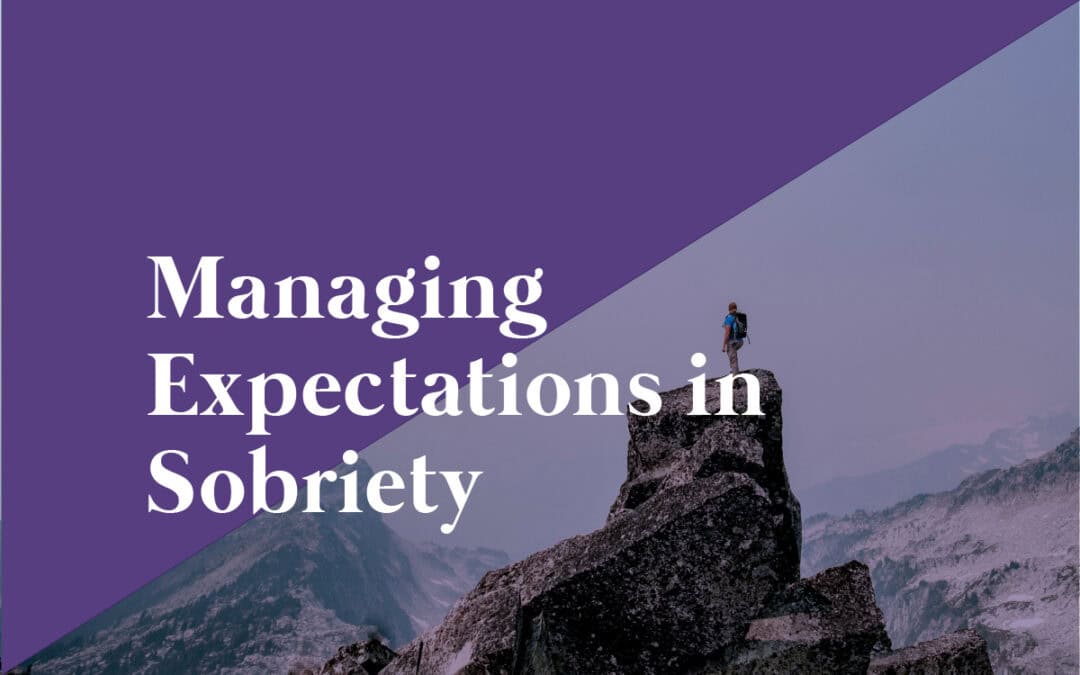Managing Expectations in Sobriety: A Deep Dive from Recovery Elevator Episode 438
Managing expectations in sobriety is one of the most important skills to develop in early recovery. In fact, our expectations…of ourselves, others, and how we think life should look without alcohol…can greatly influence our emotional stability and long-term success. In Recovery Elevator Podcast Episode 438, host Paul Churchill explores how expectations can lead to discomfort, disappointment, and even relapse…and how learning to release them can create peace, clarity, and joy.
If you’re on a path of healing, managing expectations in sobriety can be a game-changer. This blog explores Paul’s insights and how lowering expectations can reduce stress, support emotional stability, and help you thrive in your alcohol-free life.
💭 Why Managing Expectations in Sobriety Matters
As Paul says in the episode:
“Less expectations = less drinking. More expectations = more drinking.”
We don’t always realize it, but many of us come into recovery with a long list of expectations…how we think things should look. We expect to feel better immediately, we expect others to cheer us on, and we expect the process to be linear.
But as anyone who’s made it past Day 1 knows…sobriety is rarely a straight path.
Managing expectations in sobriety doesn’t mean lowering your standards or giving up on goals. It means softening your grip on how things unfold and allowing room for imperfection, discomfort, and growth.
📺 How Unrealistic Expectations Can Derail Sobriety
Since birth, we’ve been conditioned to expect comfort and pleasure. Advertisements, social media, TV…they all tell us that happiness is the default and discomfort is a problem to fix, usually with a product, pill, or drink.
But here’s the truth Paul drops:
“This pedagogy is f***ed, because it’s not even close to how the real world works.”
The idea that we should always be happy is not only false…it’s toxic in recovery. Expecting happiness 24/7 is like expecting a sunny sky every day of the year. It’s simply not how life works.
Sobriety teaches us to embrace all of our feelings, not just the pleasant ones.
📚 A Personal Story About Managing Expectations in Sobriety
In the episode, Paul shares a moment where he decided to sit down and read a book in the middle of the afternoon. Within minutes, his inner critic chimed in:
“Yo, yo, what are you doing Paul? Nope. Get up and stain the fence.”
That voice…that guilt-ridden drive to “be productive”…came from deeply rooted expectations he inherited from watching his dad work nonstop. Paul recognized this and decided to stay put, choosing rest over hustle. The book? The Myth of Normal by Dr. Gabor Maté, a powerful read about how we disconnect from ourselves to meet society’s standards.
This story is a reminder that managing expectations in sobriety also means letting go of what we think we should be doing and embracing the moment we’re in.
🔁 Awareness Is Key to Managing Expectations in Sobriety
One of the most important takeaways from Episode 438 is this:
“You can’t force yourself to stop expecting things. All you can do is become aware you’re doing it.”
That awareness is powerful. When we realize we’re expecting something that isn’t happening…whether it’s from ourselves, a partner, or the universe…we can pause, take a breath, and let go.
Over time, this awareness reduces suffering. We begin to accept life as it is, not as we think it should be.
🌈 Let Go of the Outcome to Stay Grounded in Sobriety
When we lower or release expectations, we increase our capacity for peace. This doesn’t mean we stop caring or stop striving…it means we release our need to control how things unfold.
As Paul puts it:
“So much of this journey is deconditioning, deconstructing, and uncoupling…at the neural level.”
This deconditioning is what makes recovery so transformative. We stop chasing a version of life someone else told us we should want, and start living a life that feels true to us.
⚠️ How Managing Expectations Supports Gratitude in Recovery
Expectations are future-focused. They say, “I’ll be happy when…” Gratitude, on the other hand, is rooted in the present. It says, “I’m thankful for this now.”
When we’re trapped in expectation, we miss what’s good right in front of us. By managing expectations in sobriety, we create space for appreciation…of the small wins, the quiet moments, the steady breath of an alcohol-free life.
As Paul shares:
“Expectations are future resentments on a slow boil.”
🧠 Practical Tips for Managing Expectations in Sobriety
Here are a few more gems from Episode 438:
-
“Expectations in the self are major limitations.”
-
“Argue for your limitations, and sure enough, they’re yours.” – Richard Bach
-
“Expecting happiness 24/7 is like trying to bring back Screech for another season of Saved by the Bell. Not happening.”
💡 How to Start Managing Expectations in Sobriety
Here are a few practical steps to take from this episode:
- Notice when you’re feeling disappointed…what expectation wasn’t met?
- Ask yourself: Did I expect something from myself or someone else that they couldn’t give?
- Shift from expecting to accepting. It’s okay to feel uncomfortable.
- Stay grounded in the present moment. Practice gratitude.
- Keep your recovery toolbox close: meditation, journaling, sobriety podcasts, community.
- Reflect daily on how managing expectations in sobriety is shaping your mindset and choices.
🔗 Related Reading & Listening
🙏 Final Thoughts on Managing Expectations in Sobriety
Managing expectations in sobriety isn’t about giving up or settling…it’s about making space for what’s real. It’s about removing the invisible yardstick we constantly measure ourselves against, and learning to live life on life’s terms.
As you move forward in your recovery, may you find peace in the present, joy in small moments, and the strength to let go of what you thought it would look like. Practicing managing expectations in sobriety helps us let go of rigid beliefs and embrace a more balanced, resilient life.



